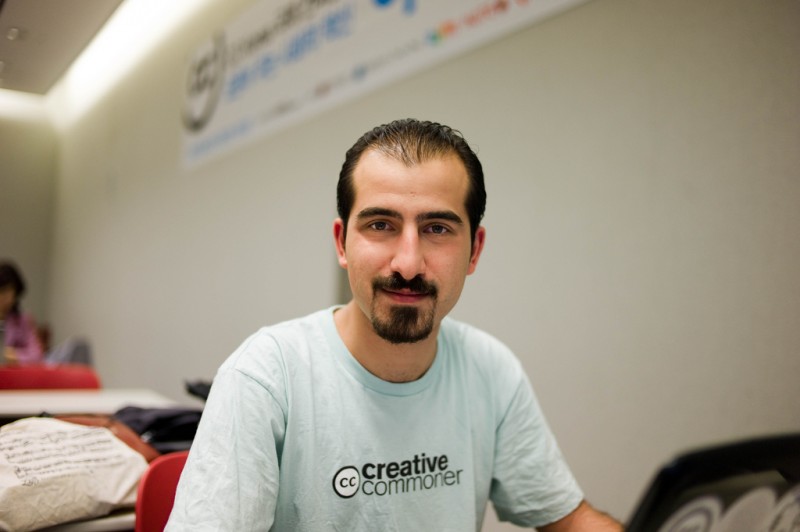
Reader favorites from 2017 at Global Voices.
Global Voices authors published more than 1,600 stories in English in 2017, on topics ranging from ‘eco-coolers’ that run without electricity [1] to the unique vocabulary of small languages [2]. These were written, researched and translated by many of our 1,200 members of our community, who live and work [3] in over 170 countries around the globe.
Our audience is also located all over the world. Since different articles resonate with different audiences in different ways, it can be tough to identify the “top” or “best” stories from Global Voices. Every story has meaning. However, based on clicks, likes, shares and comments on Facebook, we can get a clue.
With that in mind, here are some of our reader favorites from 2017.
 [4]
[4]Ognen Čemerski with his friend and colleague Jasna Koteska during the Student March, November 14, 2014. Photo by Vančo Džambaski, CC BY-NC-SA.
1. Macedonian ‘Moby-Dick’ Translator Ognen Čemerski, 42, Was a Meticulous Linguist and Engaged Educator
In terms of clicks, comments and shares, this article [4] by Filip Stojanovski [5], Global Voices’ Eastern and Central Europe editor, was one of the most popular stories of 2017 on the Global Voices Facebook page. Ognen Čemerski, who died in August, had spent 12 years working on the translation of “Moby-Dick” into Macedonian.
The main problem of translating a book from 1851 about sailing and whaling [6] was that the Macedonian language lacked maritime terminology. Most of the ethnic Macedonian population had been landlocked [7] during the last centuries, having little contact with the sea in general and sailing in particular. In order to overcome this, Čemerski had to re-construct the vocabulary by first discovering the origins of the English terms, and then trace their equivalents in Macedonian or other Slavic languages.
Read the article here. [4]
 [8]
[8]Illustrative image by andresAzp, available in Flickr: “Evening protests on February 15th in Altamira. Caracas, Venezuela. Published under Creative Commons licence (CC BY-NC-ND 2.0)
2. For Venezuela's Government, Protesting Is “Terrorism”
This story [8] was one of the most shared articles [9] on the Global Voices Facebook page in 2017:
Six protesters have died, President Maduro's government is accused of using torture on protesters to obtain false confessions [10] of “terrorism,” and evidence of police abuse is circulating on social media. Despite the clampdown, the protests in Venezuela haven't stopped since the end of March.
“The money is never enough, there are no medicines, and the streets are full of criminals, and you won't let me protest on top of it all?,” one protester [11], who was tortured by the police, said […]
Read the article here. [8]
3. An American Artist Is Inking ‘RESIST’ Tattoos for Good Causes
This article [12] highlighting a tattoo artist in the United States offering free “RESIST” themed tattoos to those who donate $100 or more to charities also was one of Global Voices’ most-shared posts on Facebook.
Nate Kaschak [13] works at A Psychic Unicorn, a tattoo and art studio owned by Rhi and Chris Wallace in the town of Kingston, Pennsylvania, population around 14,000. […]
Kaschak says he was tired of so much negativity online and wanted to encourage people to be more proactive instead of complaining.
Read the article here. [12]
 [14]
[14]Public Facebook status update by Lara Quentrall-Thomas, which says, “Excellent news! The Marriage bill has been passed. Minimum age – 18, Vote – 35 in favor – 0 against!!!!”
4. Child Marriage Is No More in Trinidad & Tobago
This article [14] received the most likes on Facebook: [15]
On June 9, 2017, Trinidad & Tobago's parliament unanimously passed legislation to outlaw the practice of child marriage, changing the legal marriage age to 18.
[However] religious opposition made what would ordinarily have been a straightforward issue a little more fraught [16] and at one point, there was doubt [16] as to whether the opposition would even support the bill.
Read the article here. [14]
 [17]
[17]The “confused” lady above is one of Brazil's well-known memes. She was actually a character from a 2004 soap opera who kidnapped a baby and killed some people who got in her way | Image: Twitter/Reproduction.
5. If You Want To Understand Brazil, You Should Check out Its Memes
Brazil ranks as the fourth country with the highest number of internet users [18]in the world. Portuguese is Brazil's only official language and the majority of its population do not speak English. While most of the internet is decidedly anglophone, Brazilians have carved out a large Portuguese-speaking digital territory of their own [19]. And they mainly use it to speak on their own terms — which means, a lot of memes.
So began this story [17] about Brazilian internet culture, which also received some of the most shares, clicks and comments on Facebook in 2017.
Read the article here. [17]
6. Five Foods From Vietnam That Might Be a Little Hard to Swallow for Non-Vietnamese
In terms of the most likes, shares and comments, nothing beats this story [20] from 2017 that covers some remarkable foods from Vietnam, including a dish called “balut”:
Balut is a developed fertilized duck egg, boiled and eaten in the shell. At about 19 to 21 days old, the duck embryos will be mature enough for you to feel the crunchy bones. The correct way to eat this delicacy is to add a bit of salt, slurp out the water, and chew on a couple of rau răm or Vietnamese coriander leaves.
Read the article here. [20]
7. Global Voices Honors the Life of Open Web Activist Bassel Khartabil, Executed by the Syrian Regime
In 2017 the Global Voices community was deeply saddened to learn about the death of Bassel Khartabil, who was killed by Syrian officials.
A Creative Commons leader in Syria who was active in projects including Mozilla Firefox and Wikipedia, Bassel Khartabil (aka Bassel Safadi) played a pivotal role in extending online access and open knowledge to the public in Syria. He was a close friend of many in the Global Voices community and participated in our 2009 Arab Bloggers Meeting.
An article about his death was one of the most-read stories on Global Voices in 2017.


